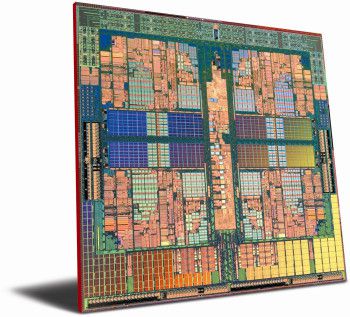From our front-page news:
AMD's Phenom line-up should have been the product to save the company from the slump they've been in for the past year, but as we are all well aware, that was not the case at all. In fact, clock-for-clock performance put Phenom below Intel's offerings, all while having a rather sizable disadvantage in power consumption. As if things needed to get worse, they have, in the form of an errata in all Barcelona processors.
Our friends at the Tech Report have been on the case for the past week and have come along nicely in their investigations. First and foremost, the errata sits with the TLB Logic for the L3 cache which can cause the computer to crash in a rare occasion. To make matters worse, a "fix" for the problem causes a further performance degradation.
Thanks to a fresh BIOS from MSI which enables the TLB patch, Scott was able to test the performance differences between various synthetic and real-world benchmarks. Things do not look that hopeful - some benchmarks show significant differences. However, some do not show a difference at all, such as Sandra's FP and Int tests.
The fact of the matter is - this is not a small issue. Applying the patch effects performance, which is unacceptable regardless of how it's analyzed. If you run out to purchase a Phenom CPU, you are purchasing a semi-maimed offering. Applying the patch degrades performance, but on the other hand, you might not ever run into a problem without applying it. It's up to you to decide whether or not the hassle is all worth it. For those who want Phenom but wish to wait until the product is fixed, that should come early next year with the 9550 and 9650.
<table align="center"><tbody><tr><td>
 </td></tr></tbody></table>
</td></tr></tbody></table>
The most troubling results here are the applications where we see large performance drops with the TLB erratum workaround active, including the Firefox web browser and the picCOLOR image analysis tool. If one happens to spend a lot of time running an application whose memory access patterns don't mix well with the TLB patch, the result could prove frustrating. The BIOS-based workaround for the TLB erratum may achieve its intended result—system stability—but it comes at a pretty steep price in terms of performance.
Source: Tech Report
Our friends at the Tech Report have been on the case for the past week and have come along nicely in their investigations. First and foremost, the errata sits with the TLB Logic for the L3 cache which can cause the computer to crash in a rare occasion. To make matters worse, a "fix" for the problem causes a further performance degradation.
Thanks to a fresh BIOS from MSI which enables the TLB patch, Scott was able to test the performance differences between various synthetic and real-world benchmarks. Things do not look that hopeful - some benchmarks show significant differences. However, some do not show a difference at all, such as Sandra's FP and Int tests.
The fact of the matter is - this is not a small issue. Applying the patch effects performance, which is unacceptable regardless of how it's analyzed. If you run out to purchase a Phenom CPU, you are purchasing a semi-maimed offering. Applying the patch degrades performance, but on the other hand, you might not ever run into a problem without applying it. It's up to you to decide whether or not the hassle is all worth it. For those who want Phenom but wish to wait until the product is fixed, that should come early next year with the 9550 and 9650.
<table align="center"><tbody><tr><td>

The most troubling results here are the applications where we see large performance drops with the TLB erratum workaround active, including the Firefox web browser and the picCOLOR image analysis tool. If one happens to spend a lot of time running an application whose memory access patterns don't mix well with the TLB patch, the result could prove frustrating. The BIOS-based workaround for the TLB erratum may achieve its intended result—system stability—but it comes at a pretty steep price in terms of performance.
Source: Tech Report
